 This gritty and action-packed series was originally marketed in seven volumes. The new edition condenses that to four, by combining the first six into three and designating each component in the pair as either Part 1 or Part 2, the original title of each Part 1 serving as the new book title for both. So this book counts as two series installments. That’s a felicitous arrangement, because installments 1-2 (now paired as Real Dangerous Girl) and 3-4 here both fit together nicely as two self-contained two-part story arcs, each featuring protagonist/narrator Kim but centering on a different challenge each time, that starts in Part 1 and finds its resolution in Part 2. But the books should be read in order; here, references are made to persons and events from the prior installments, and in order to fully understand who Kim and her wheelchair-bound kid brother Donnie are, their situation, and the development of her character, you really need to have read the preceding part of the canon. Warning: this review will contain “spoilers” for the previous book(s).
This gritty and action-packed series was originally marketed in seven volumes. The new edition condenses that to four, by combining the first six into three and designating each component in the pair as either Part 1 or Part 2, the original title of each Part 1 serving as the new book title for both. So this book counts as two series installments. That’s a felicitous arrangement, because installments 1-2 (now paired as Real Dangerous Girl) and 3-4 here both fit together nicely as two self-contained two-part story arcs, each featuring protagonist/narrator Kim but centering on a different challenge each time, that starts in Part 1 and finds its resolution in Part 2. But the books should be read in order; here, references are made to persons and events from the prior installments, and in order to fully understand who Kim and her wheelchair-bound kid brother Donnie are, their situation, and the development of her character, you really need to have read the preceding part of the canon. Warning: this review will contain “spoilers” for the previous book(s).
As I’d deduced and mentioned in my review of installment 1 (I read and wrote about the first two as separate books: what is now Real Dangerous Girl Part 1 and Part 2), the setting is an unnamed city in western New York state. It’s not named here either; but references to docks and ocean-going commerce point to Rochester, which is on Lake Ontario and can access the Atlantic via the St. Lawrence River. Several months have passed since the end of the previous book; it’s now winter. One reference suggests that Kim’s still 17; but she has to be getting pretty close to 18. (A credibility problem with the series is that it’s hard to fit all of her backstory into 17 years.) We’re not actually brought up to speed on the intervening events until Chapter 3, and Kim’s wry description of her new line of work as “killing people” might give the idea that she’s been working as an assassin. She hasn’t –but she has opted to make her living with her .357 rather than her calculator; and as she recognizes, the possibility of lethal violence is always present, especially given the sort of people who’ll employ her.
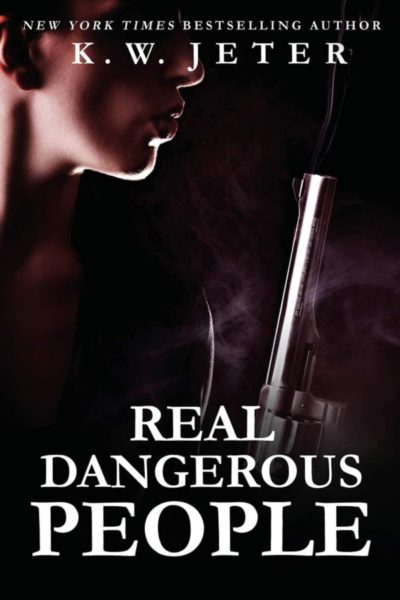 At Cole’s funeral, a meeting with Curt, an old acquaintance of his that he’d recommended her to, led to a three-month gig in “security” for one Mr. Falcone, another mobster like her former employer, who now prefers to be called Mr. Falcon since he’s looking to shed his Mafia image; also like the late Mr. McIntyre, he’s moving to position himself as more plausibly “legitimate.” (So “security” work for him involves dealing with his double-crossing employees, and attacks by thugs working for his equally shady rivals.) Near the beginning of this book, she’s invited to join his personal bodyguard team, where a sudden vacancy has opened up. But the way it opened up isn’t encouraging…. Since there are a couple of more books in the series, we know that our girl’s going to make it home at the end of the day. But she doesn’t have any such assurance, and the chances of this job ending with a tag on her toe look pretty real. She needs the money, though, since failing to provide for Donnie isn’t an option she’ll accept; and she’s about to face another unexpected existential threat to her little family unit, from a totally different quarter.
At Cole’s funeral, a meeting with Curt, an old acquaintance of his that he’d recommended her to, led to a three-month gig in “security” for one Mr. Falcone, another mobster like her former employer, who now prefers to be called Mr. Falcon since he’s looking to shed his Mafia image; also like the late Mr. McIntyre, he’s moving to position himself as more plausibly “legitimate.” (So “security” work for him involves dealing with his double-crossing employees, and attacks by thugs working for his equally shady rivals.) Near the beginning of this book, she’s invited to join his personal bodyguard team, where a sudden vacancy has opened up. But the way it opened up isn’t encouraging…. Since there are a couple of more books in the series, we know that our girl’s going to make it home at the end of the day. But she doesn’t have any such assurance, and the chances of this job ending with a tag on her toe look pretty real. She needs the money, though, since failing to provide for Donnie isn’t an option she’ll accept; and she’s about to face another unexpected existential threat to her little family unit, from a totally different quarter.
As noted above, Kim’s character is developing, and not always in ways that please her. (In fact, some developments concern and scare her.) The criminal underworld she originally entered unwittingly when she landed a job with McIntyre’s now defunct organization has become pretty much her default environment. That’s partly because no legitimate business will hire her as an accountant with no formal credentialling, even if she’s good at it, but also because, though she doesn’t like to admit it to herself, at one level she thrives on the excitement, empowerment and adrenaline rush of life in warrior mode; and she takes fierce pride in being equally good at that. Thanks to Cole’s training, she’s a very accurate, quick-reflexed markswoman, and strong and agile despite her petite stature. (And she can now kill without batting an eye –though that’s a development she fully realizes is problematical.) This career choice puts her on a tightrope between the demands of her job and her moral instincts; the tension of walking it can make her cry and vomit at times. Shades of grey often define her alternatives; there’s a lot of food for thought here in terms of moral reflection, as there often is in this genre. That’s implicit in the story, though, not embodied in explicit struggles in Kim’s mind; survival generally dictates her choices, and the one here that many readers will most intensely disagree with and disapprove of is one she makes instantly and without having to agonize over at all. (Having a family of my own, I totally understand why she doesn’t have to.)
There’s no sex, licit or illicit, in this book (or the prior installments). Kim’s not without interest in sex; but like most teens, she sees herself as unattractive. She’s never pursued a relationship, and she’s taken to heart Cole’s advice that the best option for a hired gun is celibacy. (Though given that he was in a long-term relationship with a live-in girlfriend, he failed to practice what he preached.) Compared to the prior installments, there’s an increase in bad language here, including some use of the f-word and religious profanity, though Jeter’s use of it is still restrained compared to many writers who depict this milieu. (Kim’s own language isn’t as bad as that of her colleagues, though if I were her dad I’d still call her on some of it.) In fairness, given the kind of characters we’re dealing with, the language isn’t unrealistic. Violence comes with this territory; several people here exit the world with bullets in their bodies (some of them by Kim’s hand). But none of them are particularly nice people who would elicit any tears from the average reader; I can safely promise that “no innocents were harmed in the writing of this book.” :-)
In terms of literary quality, this is a highly gripping and emotionally evocative read, and a fast-paced one. Depiction of well-drawn, nuanced characters is one of the author’s strengths; Kim herself is a vital bundle of three-dimensioned nuance, but all of the cast here come to life. (Most aren’t especially likable, except for Donnie and Mae, but I do like Kim and root for her, despite her rough edges; Jeter lets me understand where she’s coming from, and her narrative voice makes me empathize with her.) There’s also more of a mystery element here than in the previous story arc, though I still classify this as action-adventure rather than mystery. It has to be said, though, that this book isn’t as well crafted as the preceding. There are editorial issues, some minor. but several more serious. In places details, plot elements and conversations are inconsistent with things written before, which can fray (though not break) the thread of the plot. (The worst of these is where a character dies in one chapter, but reappears alive in the next one!) That cost the book a star; but I’d still recommend it to all readers of the first book (though not as the starting point for the series). And I most definitely intend to follow the series to its completion!
Author: K. W. Jeter
Publisher: Lincoln Square Books; available through Amazon, both for Kindle and as a printed book.
Book 2 of 4 in the Kim Oh series, containing previously available titles Real Dangerous People and Real Dangerous Place.
A version of this review previously appeared on Goodreads.
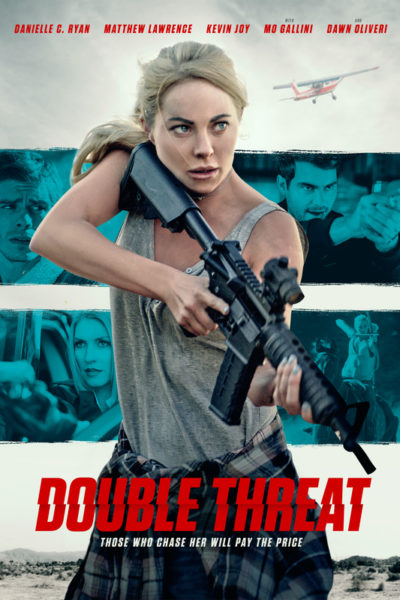 If Ryan looks familiar, that’s because she is. She starred in Survivor – no, the other film by that name – and also 626 Evolution, making a fairly decent impression in the former, and let down significantly by the approach of the latter. There, she was billed as Danielle Chuchran: not sure if the name change is a result of marriage, or simply a realization that “Ryan” is a lot easier to remember. Whether you will want to is a different matter: she’s likely the best thing in this, and when it appears, the action is decent. There just isn’t enough of it, and the stuff between the set-pieces ranges from mediocre to cringeworthy.
If Ryan looks familiar, that’s because she is. She starred in Survivor – no, the other film by that name – and also 626 Evolution, making a fairly decent impression in the former, and let down significantly by the approach of the latter. There, she was billed as Danielle Chuchran: not sure if the name change is a result of marriage, or simply a realization that “Ryan” is a lot easier to remember. Whether you will want to is a different matter: she’s likely the best thing in this, and when it appears, the action is decent. There just isn’t enough of it, and the stuff between the set-pieces ranges from mediocre to cringeworthy.




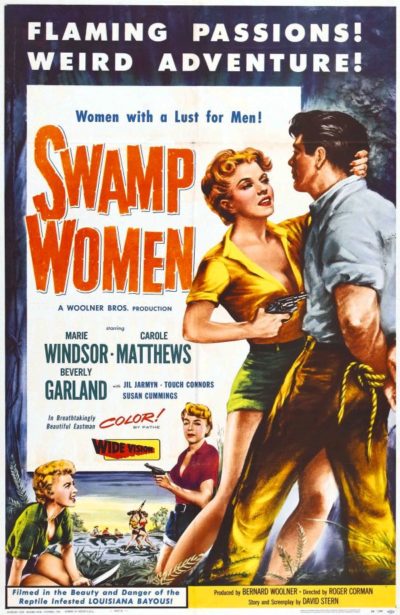 One of the earliest films directed by Roger Corman, it’d be a major stretch to call this a good film, yet I can’t deny I found it entertaining. It definitely has better female characters than most movies of the mid-fifties. Four women break out of jail and head into the swamps, in search of stolen diamonds which were previously hidden in the Louisiana swamps. Except, one of them is an undercover police officer, Lee Hampton (Mathews), who had been inserted into prison to join the gang and lead the escape, in the hope of recovering the loot. After the car breaks down, they hijack a boat owned by an oil prospector, Bob, and his girlfriend, taking them hostage as they head deeper into the bayou.
One of the earliest films directed by Roger Corman, it’d be a major stretch to call this a good film, yet I can’t deny I found it entertaining. It definitely has better female characters than most movies of the mid-fifties. Four women break out of jail and head into the swamps, in search of stolen diamonds which were previously hidden in the Louisiana swamps. Except, one of them is an undercover police officer, Lee Hampton (Mathews), who had been inserted into prison to join the gang and lead the escape, in the hope of recovering the loot. After the car breaks down, they hijack a boat owned by an oil prospector, Bob, and his girlfriend, taking them hostage as they head deeper into the bayou. The main theme of this book appears to be, “How far will a mother go, to protect her daughter?” Based on what we read here, the answer to that question appears to be, “Very, very far.” The heroine is Sherica Daniels, who initially appears to have somewhat lucked out and escaped a nasty and abusive relationship. Her husband, drug addict Roy, has just died following a pair of botched armed robberies. That should leave her and teenage daughter Ashlynn to get on with their lives. Not so fast. For it’s only a short while before Roy’s drug dealer, Tokie, shows up. He’s demanding Sherica pays her husband’s debt – and more, because he believes she knows where the unrecovered loot from Roy’s robberies was hidden. When she fails to convince Tokie otherwise, he abducts Ashlynn.
The main theme of this book appears to be, “How far will a mother go, to protect her daughter?” Based on what we read here, the answer to that question appears to be, “Very, very far.” The heroine is Sherica Daniels, who initially appears to have somewhat lucked out and escaped a nasty and abusive relationship. Her husband, drug addict Roy, has just died following a pair of botched armed robberies. That should leave her and teenage daughter Ashlynn to get on with their lives. Not so fast. For it’s only a short while before Roy’s drug dealer, Tokie, shows up. He’s demanding Sherica pays her husband’s debt – and more, because he believes she knows where the unrecovered loot from Roy’s robberies was hidden. When she fails to convince Tokie otherwise, he abducts Ashlynn.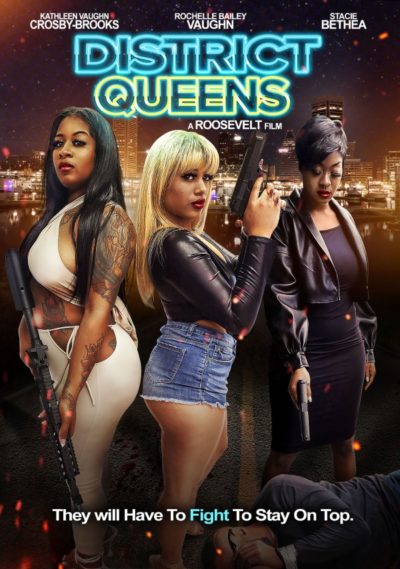 The latest stop in our ongoing tour of female-driven urban crime movies brings us to the nation’s capital in Washington, where the police are celebrating just having taken down a leading light in the city’s organized crime industry. Now, they set their sights on a new target: the gang led by Racine Robinson (Vaughan) and her two daughters, Kat (Crosby) and Candy (Bethea). These might prove a tougher nut to crack, since the Robinson crew have a harsh, zero tolerance policy to anyone who messes with them in the slightest, yet also gathered local support during the coronavirus pandemic. Indeed, Racine is so popular in the neighbourhood, a run for political office is not out of the question. However, she has rivals, who have more than a passing interest in seeing her taken out of the picture – albeit for very different reasons, in order to make room for them to rise up.
The latest stop in our ongoing tour of female-driven urban crime movies brings us to the nation’s capital in Washington, where the police are celebrating just having taken down a leading light in the city’s organized crime industry. Now, they set their sights on a new target: the gang led by Racine Robinson (Vaughan) and her two daughters, Kat (Crosby) and Candy (Bethea). These might prove a tougher nut to crack, since the Robinson crew have a harsh, zero tolerance policy to anyone who messes with them in the slightest, yet also gathered local support during the coronavirus pandemic. Indeed, Racine is so popular in the neighbourhood, a run for political office is not out of the question. However, she has rivals, who have more than a passing interest in seeing her taken out of the picture – albeit for very different reasons, in order to make room for them to rise up. This gritty and action-packed series was originally marketed in seven volumes. The new edition condenses that to four, by combining the first six into three and designating each component in the pair as either Part 1 or Part 2, the original title of each Part 1 serving as the new book title for both. So this book counts as two series installments. That’s a felicitous arrangement, because installments 1-2 (now paired as Real Dangerous Girl) and 3-4 here both fit together nicely as two self-contained two-part story arcs, each featuring protagonist/narrator Kim but centering on a different challenge each time, that starts in Part 1 and finds its resolution in Part 2. But the books should be read in order; here, references are made to persons and events from the prior installments, and in order to fully understand who Kim and her wheelchair-bound kid brother Donnie are, their situation, and the development of her character, you really need to have read the preceding part of the canon. Warning: this review will contain “spoilers” for the previous book(s).
This gritty and action-packed series was originally marketed in seven volumes. The new edition condenses that to four, by combining the first six into three and designating each component in the pair as either Part 1 or Part 2, the original title of each Part 1 serving as the new book title for both. So this book counts as two series installments. That’s a felicitous arrangement, because installments 1-2 (now paired as Real Dangerous Girl) and 3-4 here both fit together nicely as two self-contained two-part story arcs, each featuring protagonist/narrator Kim but centering on a different challenge each time, that starts in Part 1 and finds its resolution in Part 2. But the books should be read in order; here, references are made to persons and events from the prior installments, and in order to fully understand who Kim and her wheelchair-bound kid brother Donnie are, their situation, and the development of her character, you really need to have read the preceding part of the canon. Warning: this review will contain “spoilers” for the previous book(s). At Cole’s funeral, a meeting with Curt, an old acquaintance of his that he’d recommended her to, led to a three-month gig in “security” for one Mr. Falcone, another mobster like her former employer, who now prefers to be called Mr. Falcon since he’s looking to shed his Mafia image; also like the late Mr. McIntyre, he’s moving to position himself as more plausibly “legitimate.” (So “security” work for him involves dealing with his double-crossing employees, and attacks by thugs working for his equally shady rivals.) Near the beginning of this book, she’s invited to join his personal bodyguard team, where a sudden vacancy has opened up. But the way it opened up isn’t encouraging…. Since there are a couple of more books in the series, we know that our girl’s going to make it home at the end of the day. But she doesn’t have any such assurance, and the chances of this job ending with a tag on her toe look pretty real. She needs the money, though, since failing to provide for Donnie isn’t an option she’ll accept; and she’s about to face another unexpected existential threat to her little family unit, from a totally different quarter.
At Cole’s funeral, a meeting with Curt, an old acquaintance of his that he’d recommended her to, led to a three-month gig in “security” for one Mr. Falcone, another mobster like her former employer, who now prefers to be called Mr. Falcon since he’s looking to shed his Mafia image; also like the late Mr. McIntyre, he’s moving to position himself as more plausibly “legitimate.” (So “security” work for him involves dealing with his double-crossing employees, and attacks by thugs working for his equally shady rivals.) Near the beginning of this book, she’s invited to join his personal bodyguard team, where a sudden vacancy has opened up. But the way it opened up isn’t encouraging…. Since there are a couple of more books in the series, we know that our girl’s going to make it home at the end of the day. But she doesn’t have any such assurance, and the chances of this job ending with a tag on her toe look pretty real. She needs the money, though, since failing to provide for Donnie isn’t an option she’ll accept; and she’s about to face another unexpected existential threat to her little family unit, from a totally different quarter.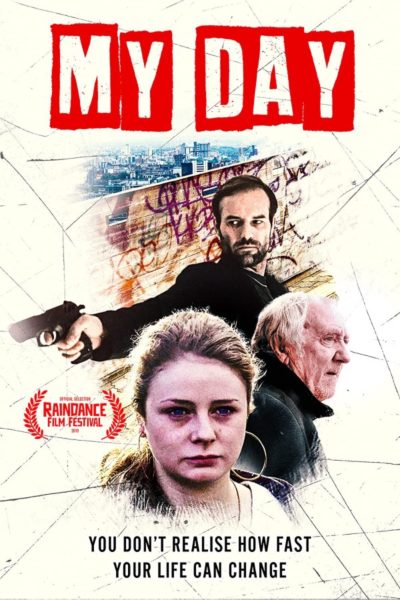 Sixteen-year-old Ally (Smith) is living her life very much on the fringes of society. Coming from a broken home, she is now homeless on the streets of London, relying on the dubious charity of questionable friends. Though Ally does have her limits as to what she’s prepared to do, she has no issue with occasional bits of work, delivering drugs for dodgy couple Carol and Gary. It’s this that gets her into trouble: a job goes wrong, after the customer tries to rape her, and Ally flees – without either the drugs or the money. Carol and Gary are bad enough. Yet even they live in mortal fear of their boss, Eastern European gangster Ilyas (Adomaitis). He wants his merch back – and Ally, as interest, for sale to his sex trafficking friends.
Sixteen-year-old Ally (Smith) is living her life very much on the fringes of society. Coming from a broken home, she is now homeless on the streets of London, relying on the dubious charity of questionable friends. Though Ally does have her limits as to what she’s prepared to do, she has no issue with occasional bits of work, delivering drugs for dodgy couple Carol and Gary. It’s this that gets her into trouble: a job goes wrong, after the customer tries to rape her, and Ally flees – without either the drugs or the money. Carol and Gary are bad enough. Yet even they live in mortal fear of their boss, Eastern European gangster Ilyas (Adomaitis). He wants his merch back – and Ally, as interest, for sale to his sex trafficking friends.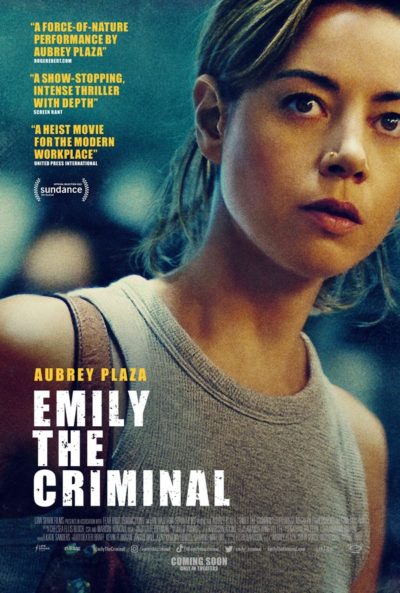 She plays Emily, a young woman saddled with an inescapable pit of student loans, for a basically useless qualification, and an unfortunate felony relegating her to food delivery work. A chance encounter brings her into contact with Youcef (Rossi). She earns $200 for making a fraudulent credit-card transaction on his behalf, and is offered the chance to earn ten times that, for a larger, riskier purchase. With regular employment clearly not the solution, Emily embraces her new, illegal career, working with Youcef, much to the disdain of his Lebanese brothers. As their infighting escalates, Youcef decides to cut and run, only to be beaten to the punch. Emily won’t stand for that: “You’re a bad influence,” says Youcef, as he and Emily prepare to rob his brother. He’s not wrong.
She plays Emily, a young woman saddled with an inescapable pit of student loans, for a basically useless qualification, and an unfortunate felony relegating her to food delivery work. A chance encounter brings her into contact with Youcef (Rossi). She earns $200 for making a fraudulent credit-card transaction on his behalf, and is offered the chance to earn ten times that, for a larger, riskier purchase. With regular employment clearly not the solution, Emily embraces her new, illegal career, working with Youcef, much to the disdain of his Lebanese brothers. As their infighting escalates, Youcef decides to cut and run, only to be beaten to the punch. Emily won’t stand for that: “You’re a bad influence,” says Youcef, as he and Emily prepare to rob his brother. He’s not wrong. 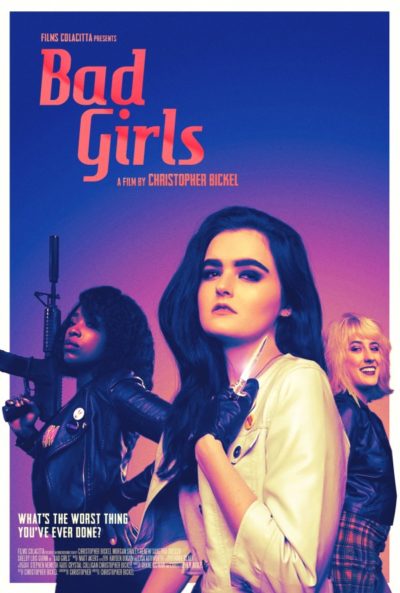 I didn’t realize until this started, it was by the director of the (non-GWG)
I didn’t realize until this started, it was by the director of the (non-GWG) 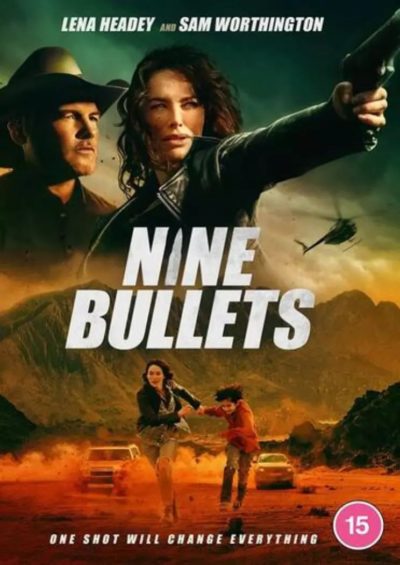 While this is not an “official” remake of Gloria, it’s so damn close that I have no problem considering it as one. Writer/director Gaston seems to have… um, a bit of a track record in this area, shall we say. She previously appeared here by directing
While this is not an “official” remake of Gloria, it’s so damn close that I have no problem considering it as one. Writer/director Gaston seems to have… um, a bit of a track record in this area, shall we say. She previously appeared here by directing 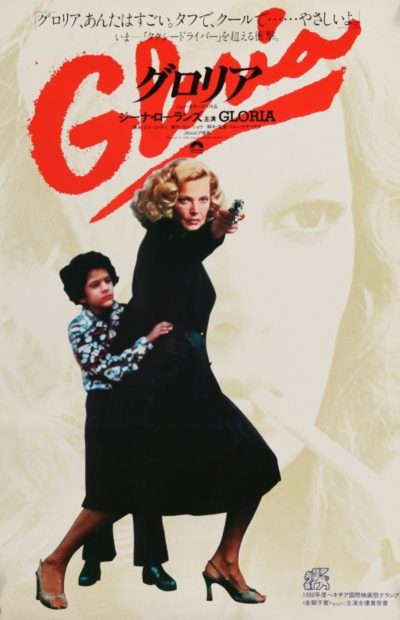 Yeah, I’ll confess to having Laura Branigan’s eighties hit running through my head on repeat almost the entire movie, even if its lyrics can only be tangentially tied to it. What also struck me is how strong of an influence this was on Luc Besson’s Leon, especially at the beginning. I mean: a criminal gang takes out an entire family in a New York tenement, except for one child, as punishment for the father having tried to steal from them. That survivor takes refuge with a very reluctant neighbour with mob ties, who then has to protect the child as they move about the city. There’s even a scene where one of the gang fires his gun at a nosy resident.
Yeah, I’ll confess to having Laura Branigan’s eighties hit running through my head on repeat almost the entire movie, even if its lyrics can only be tangentially tied to it. What also struck me is how strong of an influence this was on Luc Besson’s Leon, especially at the beginning. I mean: a criminal gang takes out an entire family in a New York tenement, except for one child, as punishment for the father having tried to steal from them. That survivor takes refuge with a very reluctant neighbour with mob ties, who then has to protect the child as they move about the city. There’s even a scene where one of the gang fires his gun at a nosy resident.